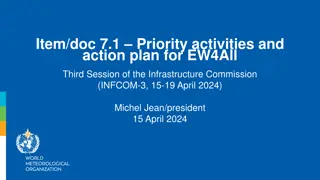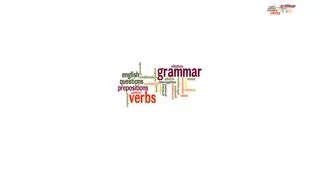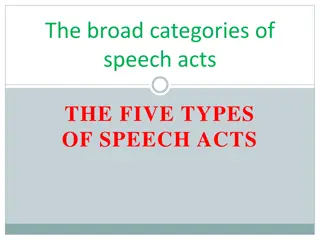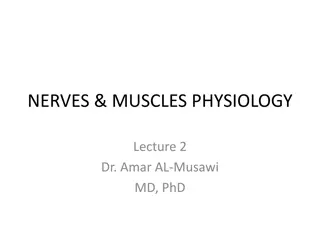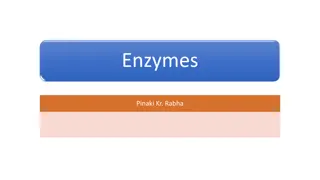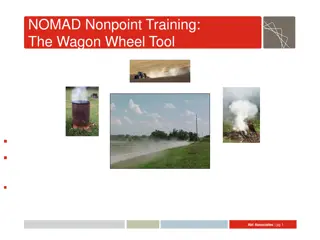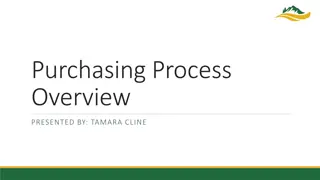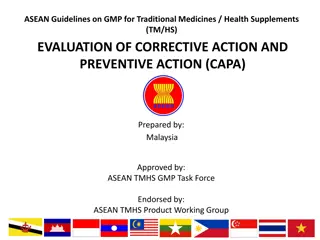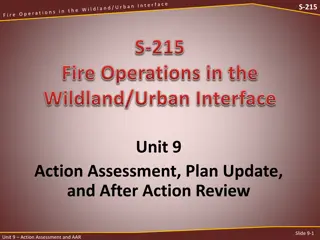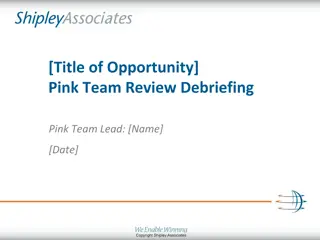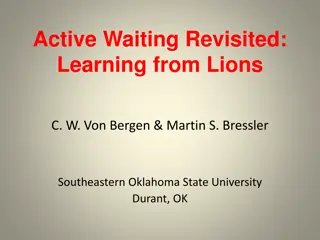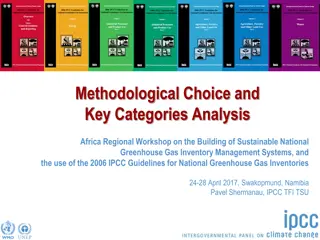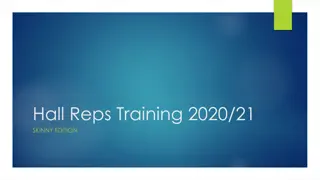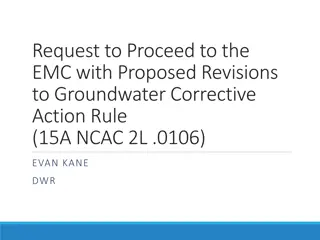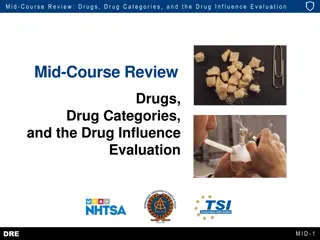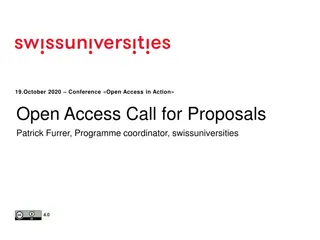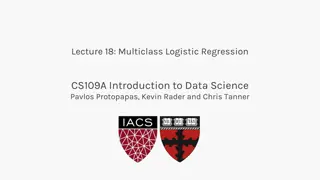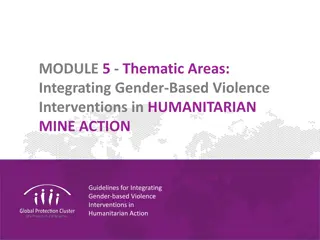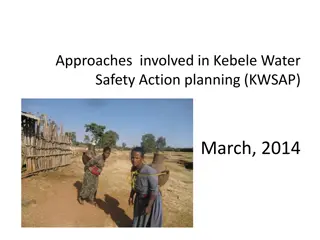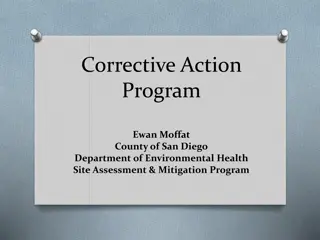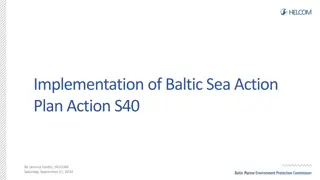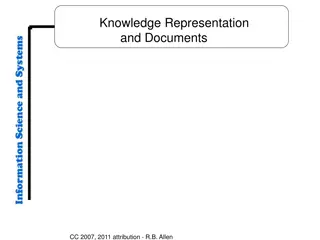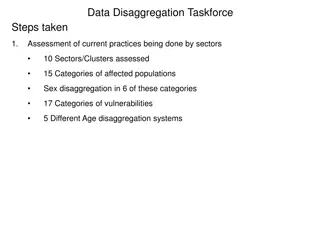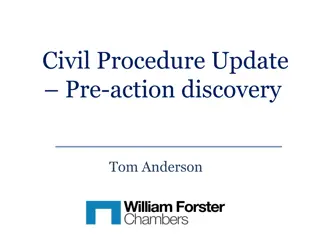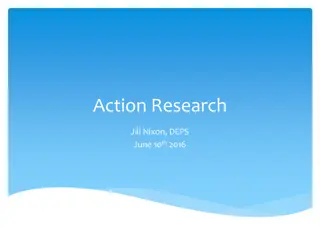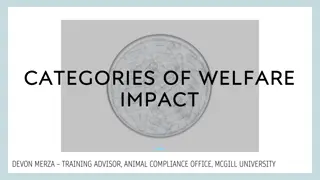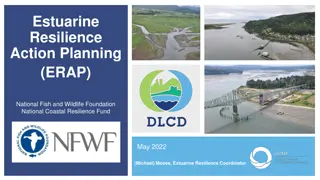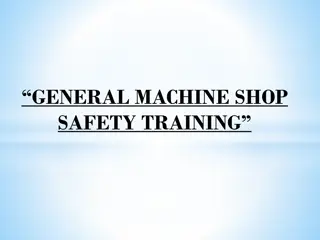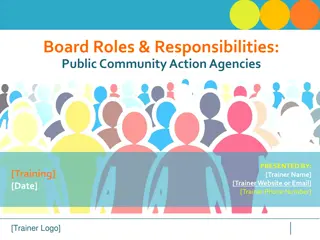Priority Activities and Action Plan for EW4All Infrastructure Commission: INFCOM-3 Session
The document outlines the priority activities and action plan for the Third Session of the Infrastructure Commission (INFCOM-3) within the Early Warnings for All initiative. It includes background decisions, a draft list of priority activities, and an action plan for contributions to the initiative.
5 views • 10 slides
Understanding Verbs: Action vs. State, Dynamic vs. Stative
Verbs are essential in sentences, describing actions or states of subjects. They can convey a sense of action like running or state like being. The distinction between dynamic (action) and stative (non-action) verbs is crucial, with dynamic verbs being used in continuous tenses and stative verbs des
0 views • 31 slides
The Five Categories of Speech Acts Explained
Speech acts are divided into five categories: Verdicatives, Exercitives, Commisives, Behavitives, and Expositives. Verdicatives involve giving a verdict, Exercitives give a decision on a course of action, Commisives involve committing to an obligation, Behavitives are used in communication activitie
1 views • 10 slides
Understanding Nerves and Muscles Physiology: Lecture Insights by Dr. Amar AL-Musawi MD, PhD
Delve into the intricacies of cardiac action potential, mechanism of action potential propagation, rhythmicity in excitable tissues, and the crucial concept of refractory period. Explore how voltage-gated channels influence the duration of action potential and learn about the spontaneous generation
0 views • 12 slides
Understanding Enzymes: Nature, Classification, and Mechanism of Action
Enzymes are biocatalysts synthesized by living cells. They are protein in nature and specific in their action. This article delves into the definition of enzymes, classification based on enzymatic action, enzyme class reactions, structure, and mechanism of enzyme action, highlighting how enzymes pla
1 views • 19 slides
Nonpoint Source Categories: The Wagon Wheel Tool Training Agenda
Delve into the comprehensive training agenda for the Wagon Wheel Tool focusing on nonpoint source categories. Explore options for submitting data to EPA, templates for inputting data, and interactive demonstrations. Understand the staggered development plan of different source categories and learn a
0 views • 16 slides
High-Level Overview of Purchasing Process for Various Purchase Categories
This training presented by Tamara Cline offers a high-level explanation of the purchasing process for purchases exceeding $10,000, between $10,000 and $88,300, over $88,300, and public works. It covers process deviations resulting in audit findings and corrective action plans without detailed requis
0 views • 20 slides
ASEAN Guidelines on GMP for Traditional Medicines: Evaluation of Corrective Action and Preventive Action
The ASEAN Guidelines on GMP for Traditional Medicines discuss the importance of Corrective Action and Preventive Action (CAPA) for maintaining quality in health supplements. CAPA involves identifying nonconformities, implementing solutions, and preventing future occurrences through continuous improv
1 views • 47 slides
Understanding Alternative Investment Funds (AIFs) and Their Categories
Explore the world of Alternative Investment Funds (AIFs), including their introduction, categories, regulations, and taxation. Discover the benefits of AIFs, such as flexibility, diversification, and potential for higher returns. Learn about the entry of AIFs in the investment domain and the various
0 views • 30 slides
Effective Action Assessment and Plan Update Strategies
Assessing the effectiveness of action plans is crucial for successful outcomes. This content provides insight into the key considerations for evaluating and updating action plans, including monitoring strategy validity, tactic effectiveness, communication adequacy, and more. Through a series of slid
0 views • 10 slides
Introduction to Builders Law: Industry Context, Purpose, Administration, and Registration Categories
Over 600 companies in the Contractor Development Industry contribute significantly to the Cayman Islands' GDP. The Builders Law aims to protect consumers and businesses, enhance industry competency, and establish registration categories for different types of contractors. The Builders Board oversees
0 views • 15 slides
Pink Team Review Debriefing Summary and Action Plan
Pink Team recently conducted a comprehensive review debriefing, highlighting key findings, detailed insights, recommendations, and action items. The team aims to enhance product quality by effectively relaying findings to the proposal team, implementing action items, and achieving substantive improv
0 views • 8 slides
Learning from Lions: Action, Procrastination, and Managerial Productivity
Every morning, the African gazelle and lion embody the essence of action and survival. While swift action is vital for success, procrastination and unproductive busyness can hinder progress. Understanding the balance between action and strategic waiting, as observed in lions, can enhance managerial
0 views • 17 slides
Understanding Methodological Choice and Key Categories Analysis in Greenhouse Gas Inventory Management
Methodological choice and key categories analysis play a crucial role in managing uncertainties in greenhouse gas inventories. By prioritizing key categories and applying rigorous methods where necessary, countries can improve the accuracy and reliability of their emissions estimates. Key categories
0 views • 24 slides
Hall Reps Training 2020/21 Skinny Edition Overview
Dive into the Hall Reps Training 2020/21 Skinny Edition to discover your role, support systems available, basics of safeguarding, and how to engage your hall with Action projects. Learn about the Action Committee, responsibilities, sub-sections of Action, and the schedule for action meetings. Get re
0 views • 21 slides
Proposed Revisions to Groundwater Corrective Action Rule for EMC Review
The document outlines proposed revisions to the Groundwater Corrective Action Rule (15A NCAC 2L.0106) for Environmental Management Commission (EMC) review. Recommendations include clarifying terminology, compliance boundaries, non-permitted activities, and permit types. Two draft rule options are pr
0 views • 9 slides
Comprehensive Review of Drugs, Categories, and Drug Influence Evaluation
This mid-course review covers key aspects such as defining drugs, naming drug categories and subcategories, identifying drug categories for specific drugs, components of drug influence evaluation, and examinations conducted as part of the evaluation process. The content also includes identifying dru
0 views • 28 slides
Understanding Affirmative Action: Origins and Criticisms
Affirmative Action was first proposed in the US by President John F. Kennedy in 1961 to combat discrimination. It aimed to prevent discrimination based on race, color, religion, sex, and national origin. This policy evolved into two forms: Strong Affirmative Action, which involves preferential treat
0 views • 39 slides
Open Access in Action Conference Overview
The Conference Open Access in Action on October 19, 2020, highlights the Open Science Programme, National Open Access Strategy, and Action Plan 2018-2024. It covers topics like Open Research Data, the future Strategy & Action Plan, and the drive towards free access to publicly funded research public
1 views • 29 slides
Understanding Multiclass Logistic Regression in Data Science
Multiclass logistic regression extends standard logistic regression to predict outcomes with more than two categories. It includes ordinal logistic regression for hierarchical categories and multinomial logistic regression for non-ordered categories. By fitting separate models for each category, suc
0 views • 23 slides
Guidelines for Integrating Gender-Based Violence Interventions in Humanitarian Action
This module focuses on integrating gender-based violence interventions into humanitarian mine action, providing guidelines, agenda, outcomes, and strategies for implementation. It emphasizes informing and supporting humanitarian actors to develop action plans and accountability measures to address g
0 views • 56 slides
Understanding Membrane Potential and Action Potentials in Excitable Cells
Membrane potential, resting potential, and action potentials play crucial roles in the functioning of excitable cells like neurons, muscle cells, and endocrine cells. Voltage-gated channels, depolarization, and repolarization are key processes involved in generating and propagating action potentials
0 views • 26 slides
Approaches Involved in Kebele Water Safety Action Planning (KWSAP) - March 2014
The Kebele Water Safety Action Planning (KWSAP) initiative in Ethiopia's Amhara region aimed to enhance WASH performance by implementing a water safety plan approach. Key steps included training sessions, workshops, collaboration with stakeholders like WWT and KWT, risk assessments, action planning,
0 views • 10 slides
San Diego Environmental Health Corrective Action Programs Overview
In the County of San Diego, the Department of Environmental Health oversees Corrective Action programs for permitted facilities. This includes the Corrective Action Designation, SAM Programs, exclusions from Corrective Action, and sources of Corrective Action cases. The program covers releases from
0 views • 12 slides
Direct Action Democracy in Korea Presentation
A presentation by Prof. Kuk-Woon LEE on the concept of Direct Action Democracy in Korea, focusing on the Candlelight Rally of 2016-2017 and the need for action, deliberation, and decision-making in democracy. The presentation explores beyond the traditional dichotomy of direct and indirect democracy
0 views • 38 slides
Implementation of Baltic Sea Action Plan Action S40 Overview
The Baltic Sea Action Plan aims for a healthy Baltic Sea environment by implementing 199 actions and measures by 2030. Action S40 focuses on identifying fish species needing better data by 2024 and implementing measures for good environmental status. Programs are established to record and report dat
0 views • 12 slides
Understanding Knowledge Representation and Categories in Information Systems
Exploring various types of representations and categories, this content delves into Aristotle's classical view of categories, the contrast between Aristotle's empirical approach and Plato's Ideals, the concept of prototypes, and different models for categorization. It highlights how entities are cla
0 views • 21 slides
Data Disaggregation Taskforce: Assessment and Recommendations on Vulnerabilities
The Data Disaggregation Taskforce is conducting an assessment of current practices across sectors, assessing 10 sectors/clusters, 15 categories of affected populations, and identifying vulnerabilities in 17 categories. The Taskforce is working on harmonizing categories and finalizing recommendations
0 views • 6 slides
Pre-action Discovery in Civil Procedure: NT Supreme Court Rules
Pre-action discovery allows a party to obtain information from a potential defendant or non-party before commencing formal legal proceedings. The NT Supreme Court Rules Order 32 outline the procedures for pre-action discovery, including when there is reasonable cause to believe that relief may be ob
0 views • 13 slides
Understanding Collaborative Action Research in Education
Collaborative Action Research (CAR) is a systematic approach that combines action and reflection to bring about improvement in educational practices. It involves individuals or groups researching aspects of their own practice to facilitate progress and deeper understanding. The process includes defi
0 views • 11 slides
Prioritisation of Emerging Contaminants: NORMAN Approach Overview
The NORMAN approach aids in prioritising emerging contaminants by categorising substances into action categories based on knowledge gaps and then prioritising them for further action. Typical steps involve choosing candidate substances, relevant parameters, using prioritisation algorithms, and addre
0 views • 17 slides
Prioritization of Emerging Contaminants in Europe
The NORMAN approach focuses on setting priorities among emerging contaminants in Europe by selecting over 700 substances based on expert judgment and scientific literature citations. The prioritization scheme specifically designed for emerging substances involves assessing knowledge gaps and necessa
0 views • 17 slides
Evolution of Welfare Impact Categories in Animal Research Guidelines
Canadian Council on Animal Care (CCAC) published updated guidelines titled "Categories of Welfare Impact" in 2024, replacing the Categories of Invasiveness. The new guidelines focus on animal experiences, procedures carried out on animals, and positive impacts on animal welfare. The categories (A-E)
0 views • 21 slides
Estuarine Resilience Action Planning Overview
Estuarine Resilience Action Planning (ERAP) led by Michael Moses aims to enhance coastal resilience through community-driven, green infrastructure solutions. The three-part approach includes needs assessment, action analyses, and goal setting. The focus is on leveraging local partnerships and incorp
0 views • 6 slides
Machine Shop Safety Training and Equipment Usage
Understanding the importance of machine shop safety training is vital to prevent accidents. Familiarize yourself with terms like pinch points, reciprocating motion, transverse motion, cutting action, punching action, shearing action, and bending action to promote a safe working environment. Proper u
0 views • 40 slides
Decentring Collective Action in Internet Activism: A Study on Collective Agency in China
This study explores the concept of collective agency in internet activism within the context of social movements in China. It discusses the role of ICT in virtual collective action, the structural preconditions for collective action, and the shift towards a more decentralized approach to collective
1 views • 16 slides
Understanding Syntax and Lexical Categories in English Grammar
Syntax is the study of rules in generating grammatical sentences, focusing on building grammars that produce well-formed English sentences. It involves organizing words into categories like nouns, verbs, adjectives, and adverbs to form phrases and clauses. Lexical categories are determined based on
0 views • 33 slides
Climate Action Project - Inspiring Change in Schools
Urgent climate change issues were explored this week, emphasizing the importance of everyone's involvement. The impact of climate change on Earth and the significance of climate justice were highlighted. Climate anxiety and global solutions were discussed, emphasizing that personal actions can lead
0 views • 8 slides
Understanding Tripartite Board Operations in Public Community Action Agencies
This training material explores the roles and responsibilities of boards in public community action agencies, focusing on tripartite board operations. It covers topics such as authority delegation, funding requirements, and scenarios to help board members understand their roles better. Created in co
0 views • 14 slides
UNMAS Presentation on Mine Action and Humanitarian Assistance
In a presentation by Sarah Marshall, Chief of the Geneva Office at the United Nations Mine Action Service, the 55th Graduate Study Programme was discussed, highlighting the crucial role of UNMAS in saving lives, supporting peace initiatives, and managing explosive threats. The presentation covered U
0 views • 7 slides
